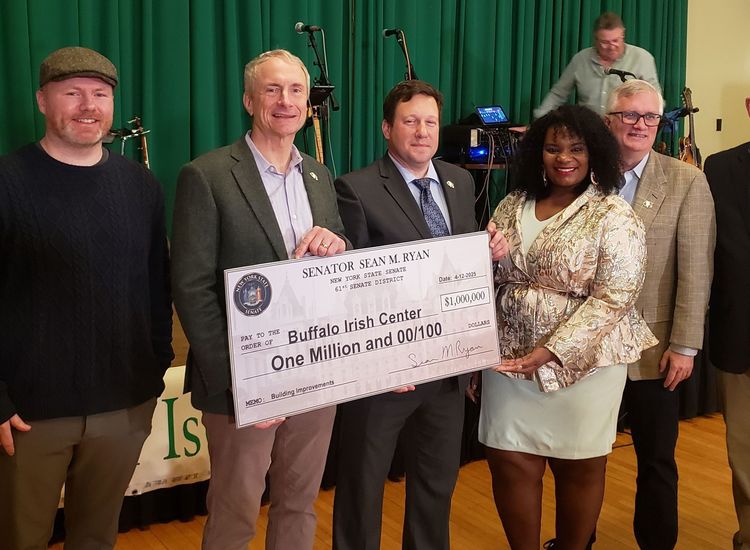Two years after their self-titled debut recording, Girsa has released their second CD, “A Sweeter Place.” What’s immediately noticeable on the new album is how much this octet, based in Pearl River, N.Y., has grown in cohesion, confidence, and risk-taking. That steady advance previously attracted a booking agent, Real Good Music, and Milwaukee Irish Fest, the largest Irish music festival in the U.S., where the band performed for the first time last year.
On the new album, Girsa displays a heightened egalitarianism. The eight members are listed alphabetically inside the CD sleeve, and more attention to balance in both sequencing and workload is apparent in the alternation of medleys with songs and in the parenthetical acknowledgment of the individual member shouldering the main vocal responsibility on each song. The two instrumental exceptions are for fiddler Maeve Flanagan, recognized as composer and lead player of “The Broken Clock / I Forget / Sligo Princesses / Gort na Coiribe,” and button accordionist Blaithin Loughran, the lead player of “The Orphan / Jonathan Roche’s.”
The album’s instrumental opener, “Man in the Bog / The Compromise,” sets the tone, revealing tangy tucks of improvisation within an exemplary tempo and close-knit ensemble playing.
Deirdre Brennan’s able mandolin picking kicks off “75 Fingers,” another Maeve Flanagan tune. It is followed by a Paddy O’Brien tune, “Tonn Teine” (misspelled on the CD as “Towne Teine”; Tonn Teine is a mountain in Tipperary), and “Bang Your Frog on the Sofa,” a reel inspired by a Tommy Peoples’ triplet played by fiddler Will Harmon, the tune’s composer, in Helena, Montana. At one point, some intentionally daring dissonance from fiddler Maeve Flanagan surfaces, confirming Girsa’s confidence in taking risks.
Blaithin Loughran is a button accordionist of ripening skill, amply displayed in “The Orphan / Jonathan Roche’s.” In this showcase track, she continues to make her mark on the myopically disparaged box, an instrument that, like any other, can “sing” in the right hands.
Maeve Flanagan’s own showcase on her own tunes, “The Broken Clock / I Forget / Sligo Princesses / Gort na Coiribe,” is a marvel. It begins with a faint trace of a classical-music understructure developed by subtly advancing changes in repeated and sometimes partially improvised phrases, all overlaid by a glistening melodicism from her masterful touch on the bow. If Maeve Flanagan can pluck more melodies like these from her compositional quiver, we could be witnessing the dawn of Irish America’s next standout tunesmith.
For combined firepower and finesse from Girsa, it’s hard to overlook the impact of “Harnett’s / The Old Favorite” and “Beauties of Autumn / Cathal McConnell’s / Paddy Marsh’s.” The band can just as easily take a more progressive tack in “Ur Chill An Chreagain / Clare Reel / Lochaber Badger “ and in “Reel of Rio / High Road to Linton,” the latter spiced by Margaret Dudasik’s dobro playing.
Pamela Geraghty’s guitar and accordion playing certainly adds punch and polish to the CD, as do Bernadette Flanagan’s and Emily McShane’s piano and bodhran playing, and Kristen McShane’s fiddling.
The album’s eight songs similarly show an appealing diversity, ranging from strict Irish trad, to Scottish singer-songwriter balladry, to rock-pop, and even to a concluding bit of bluegrass. Girsa possesses a rare bounty of four good singers, and each one undertakes two songs.
Emily McShane admirably refreshes “Rolling Hills of the Border,” an otherwise middling ballad written by 1960s Glaswegian folk-revival linchpin Matt McGinn (1928-1977), and she brings a unique tenderness to her interpretation of John Spillane’s superior “Passage West.”
Deirdre Brennan is becoming a remarkable vocalist, able to slip under the skin of a song and inhabit it. She skillfully bends notes, inserts melismas, and uses her flexible vocal register to bring new meaning to songs penned and popularized by others--in this case, “Irish Heartbeat” by Van Morrison and “Garden Valley” by Perthshire singer-songwriter Dougie MacLean.
Pamela Geraghty gives an absolutely spellbinding vocal performance of “Ar Eireann Ni Neosfainn Ce Hi” (“For Ireland, I’ll Not Tell Her Name”), which she arranged and in which she accompanies herself on accordion. Her collaborative singing with guest vocalist Don Stiffe on “Mountains of Pomeroy,” which she co-arranged and in which she’s joined by Joanie Madden on flute, is another high point. (The CD leaves the impression that “Mountains of Pomeroy” is traditional, but it was actually written by George Sigerson.) Margaret Dudasik sings “Captain Captain,” a song of indifferent quality that she nevertheless hoists through a savvy delivery. But in “There Is a Time,” Dudasik finds better material to match her vocal ability. The Dillards, a bluegrass band founded in 1962 and perhaps best known as the “Darlings” on “The Andy Griffith Show,” initially recorded this song composed by band members Rodney Dillard and Mitch Jayne. It bridges bluegrass and old country music with a soupcon of Ozark Mountain gospel, and the four-part a cappella passage in Girsa’s version recalls the Dillards’ own multi-part vocal harmony.
It will be interesting to see if “There Is a Time,” the final album track, leads to an even more expansive repertoire for Girsa. Last summer in a concert at Pearl River High School, the band had some fun with a line or two from the hit “Bad Romance” by former Catholic schoolgirl Stefani Germanotta, a/k/a Lady Gaga. But hold off on any speculation of an emerging Ladies GaGirsa.
Whatever the band chooses to perform, it will undoubtedly take on a distinctive Irish flavor and rely on Irish acoustic instrumentation. The eight women in Girsa have grown up. Their splendid second album proves it. That’s why, in Irish music, they occupy a sweeter place than ever before. They earned it--and my strong praise--the old-fashioned way: through talent.
I highly recommend Girsa’s “A Sweeter Place,” available at www.girsamusic.com.
Gil Scott-Heron, 1949-2011
On May 28, singer, songwriter, instrumentalist, novelist, and poet Gil Scott-Heron died at St. Luke’s Hospital in New York City. He was 62 years old.
When I first heard his song “The Revolution Will Not Be Televised” in 1973, it stunned me with its satirical wit, street vernacular, insight, and anger, all wrapped in a declamatory delivery presaging rap, hip-hop, and other spoken-word performance set to a hypnotically rhythmic beat.
That song was the first of several others by Gil Scott-Heron, including “The Bottle,” “Johannesburg,” and “Whitey’s on the Moon,” that stirred me. I thought then, and think now, that the best of his music has few equals in the canon of protest songs.
Why mention him here in a column devoted to Irish traditional music? Because the most ardent lovers or practitioners of Irish trad whom I know and respect also admire other forms of music, such as his.
It’s why Girsa ended their new album with a bluegrass song: to stretch.










